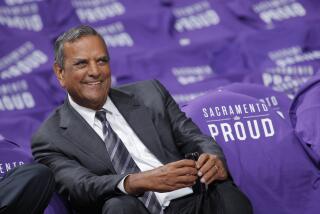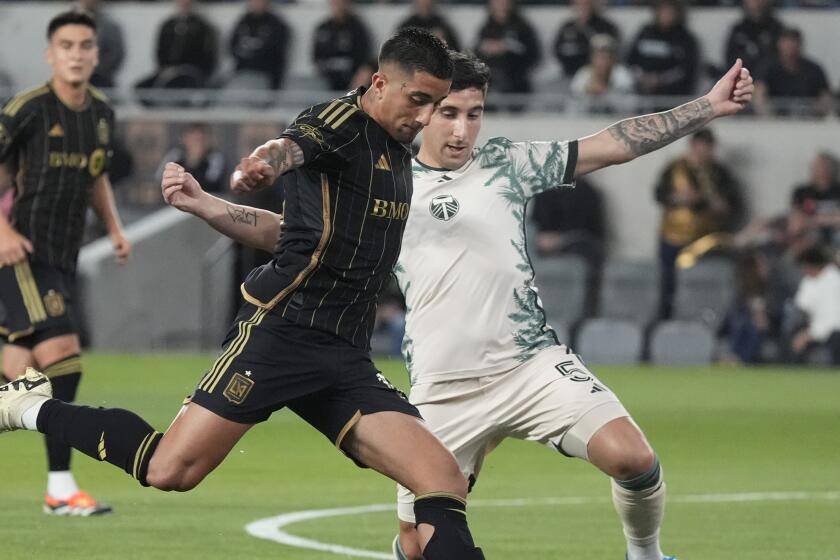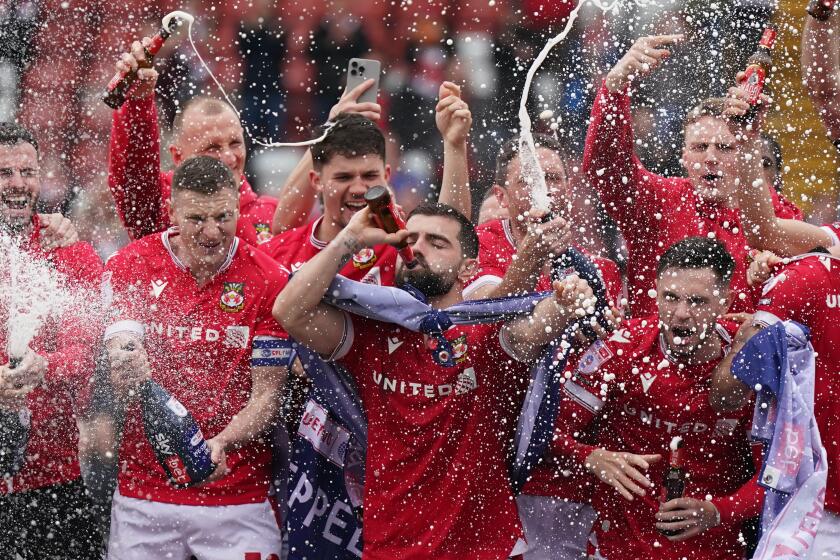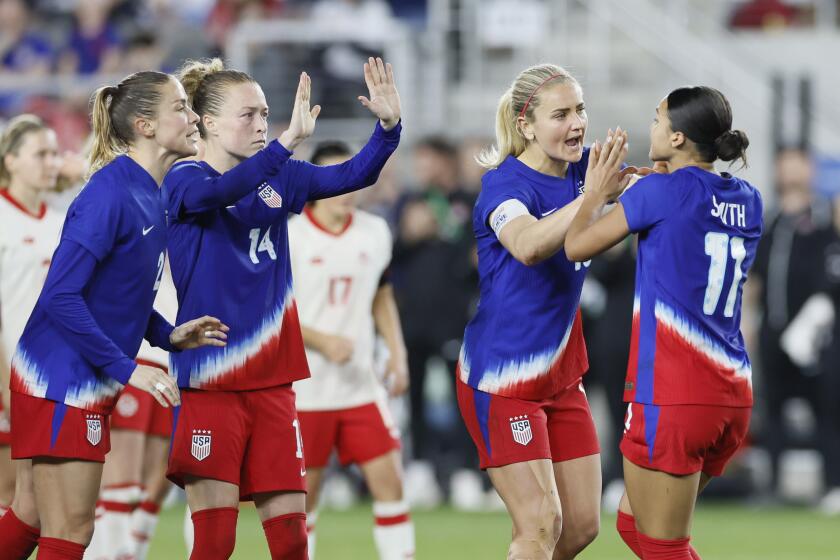Soccer Stars Are on Way, or Are They? : Promoter of Sunday’s Game Battles Hassles; Anybody Seen Diego?
To understand just why George Taylor has those dark rings beneath his eyes and that frown furrowing his brow, it is necessary only to consider the case of Igor Belanov and Rinat Dasaev.
Belanov and Dasaev are, respectively, a forward and a goalkeeper on the Soviet Union’s World Cup soccer team.
They are also 2 of the 33 outstanding players from 17 countries that Taylor has brought--or is in the process of bringing--to Los Angeles in time for Sunday’s FIFA/UNICEF World All-Star Game at the Rose Bowl.
In the case of the two Soviets, that involved a great deal more than a simple flight from Moscow.
As Taylor, a transplanted Dutchman living in New York, tells it, getting Belanov and Dasaev here was a promoter’s nightmare.
“We had sent them prepaid tickets and you’d think, ‘Well, that’s all wonderful and done,’ ” he said. “And then Viacheslav Koloskov, the guy from the (Soviet soccer) federation there, says he’s sorry but the U.S. Embassy doesn’t give them a visa. So here you are sitting in L.A. and you think they’re in the airplane and then you get a Telex that they don’t even have a visa.
“So in 24 hours you have to call the State Department (and) the U.S. Embassy. You have to talk to people you’ve never talked to in your life to get them visas.
“And then, finally, there’s this other phone call; they have now visas, and now the point is you have to tell Aeroflot to reissue the tickets in Moscow.”
Taylor sighs, his weariness evident even over the telephone.
“We haven’t seen too much of bed in the last four days,” he said.
And it’s not over yet. On Friday, the status of France’s Michel Platini switched from definite to probable, which is why Taylor has 17 players listed on “The Rest of the World Team” instead of 16.
Today, Taylor is keeping his fingers crossed that nothing goes wrong in the arrival plans of his most prized player--Diego Maradona, the captain of Argentina’s World Cup-winning team.
Maradona is scheduled to arrive on a flight from Tahiti, where he has been vacationing since his World Cup triumph in Mexico last month. But, like Belanov and Dasaev, he, too, has caused Taylor sleepless nights.
“Maradona is somewhere on an island--we know where he is, of course--in the Pacific,” Taylor said. “He’s coming in on Saturday. We are scared to death that the flight is canceled. So finally we persuaded his manager that he will catch an earlier flight, so at least if he misses one flight he still makes the other flight.
“I have examples like that by the plenty,” Taylor said, his near exhaustion continuing to fracture his normally fine grammar. “(Italy’s Bruno) Conti was supposed to fly (Thursday), and I get a Telex that he’s coming Saturday.
“Then, of course, you have also the good parts. (Mexico’s Fernando) Quirarte and (Manuel) Negrete are coming in early. (Argentina’s Jose Luis) Brown is already here. (South Korea’s Chang-Sun) Park is here. (Scotland’s Gordon) Strachan and (Northern Ireland’s Pat) Jennings were so kind to come early so that they could speak to the English press. So we have the good and the other.”
The good and the other. Fortunately for Taylor, there has been more of the former than the latter.
By Sunday morning, if all goes well, all the players will be safely here. Given the quality of the teams he has assembled, Taylor will have reason to congratulate himself, but he will not be able to claim 100% success.
For example, RTD buses plying the streets of Los Angeles might be plastered with advertising posters heralding the appearance of Maradona and Mexico’s Hugo Sanchez, but Sanchez will not be here.
Nor will West Germany’s captain Karl-Heinz Rummenigge or England’s Gary Lineker, the World Cup’s leading goal scorer. And there will be other notable absences. In fact, of the 23 players first selected and announced at a press conference in Mexico City June 20, only 11 will be on the final rosters, 10 if Platini fails to show.
All the same, both teams--the game pits “The Americas” against “The Rest of the World”--feature their fair share of exceptional talent.
Taylor, for one, is pleased.
“Personally, I’m very happy, especially when I compare it to 1982,” he said. The first FIFA/UNICEF World All-Star Game was played in 1982 at East Rutherford, N.J.
“It’s not easy because you’re dealing with so many countries all over the world, with time differences, and especially with clubs that would rather see the players not go than go. Because most of them are just starting their training prior to the season and they have seen a lot of their players just come back from the World Cup either injured or exhausted or whatever. So you’re not dealing with a bunch of very willing people.”
Still, Taylor has, with a lot of help, managed to put together teams that he believes will bring the fans to the Rose Bowl and leave the respective coaches--West Germany’s Franz Beckenbauer and the Netherlands’ Johan Cruyff for “The Rest of the World” and Mexico’s Bora Milutinovic and Argentina’s Carlos Bilardo for “The Americas”--satisfied that the squads are evenly balanced.
Taylor said that Sunday’s attendance could come close to equaling or surpassing that of 1982, when the game drew a sellout crowd of more than 77,000 to Giants Stadium.
“We could have 75,000 and up because I think that we have created a lot of momentum,” he said. “And apparently everybody wants to see Maradona. I think that’s the big attraction.”
Taylor makes no apology for the absence of some stars. In some cases it was because their clubs would not release them. In some other cases, they simply were not selected. Others, such as Denmark’s Preben Elkjaer, developed illnesses and had to bow out.
“You have to look at it not only from a name point of view, but especially you cannot have 10 strikers and three defenders,” Taylor said, explaining that the teams have to be balanced by position.
“A lot of people that don’t know soccer say, ‘Oh, why isn’t he coming?’ Well, you have to make a choice. When you bring in (Italy’s Paolo) Rossi and you bring in Conti, that means that you cannot have two other strikers because Beckenbauer will say to me, ‘What the hell are you doing? I need (West Germany’s Felix) Magath in the defense, I need Strachan in the midfield. I don’t have places for 10 strikers.’
“So we have two very balanced teams. We were a little bit afraid in the beginning that we would miss out on some defenders in “The Americas” team. So when (Brazil’s) Julio Cesar and Josimar and (Argentina’s) Brown came through, we said wonderful.
“Each player will play at least one half. The reason is simple. This is not a game with winners and losers. There is only one winner, and that is UNICEF. We are not going to invite players from all over the world to come here and then leave them sitting on the bench.”
All-Star Game Notes The referee for Sunday’s game will be David Socha of Ludlow, Mass. Socha also was the referee in the 1982 all-star match at Giants Stadium when a team representing Europe defeated one representing the rest of the world, 3-2. . . . Of the 16 players representing “The Americas” in this year’s match, four are from Brazil, four are from Mexico, four are from Paraguay, three are from Argentina and one, UCLA’s Paul Caligiuri, is from the United States. A total of 12 countries are represented on “The Rest of the World” team. . . . Only one player among the 33, Switzerland’s Heinz Hermann, was not a member of one of the teams that reached the World Cup final in Mexico. . . . The kickoff for Sunday’s game is set for 1 p.m. Among those present will be Pele. . . . The part of the game’s proceeds that will be going to UNICEF--a guaranteed minimum of $250,000--will be used to help the families left homeless by last September’s earthquakes in Mexico. . . . The match is being televised by the Spanish International Network (SIN) but is being blacked out locally. It will be shown in Los Angeles next Saturday.






